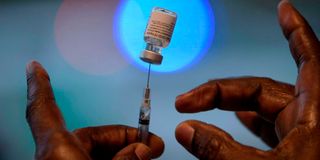It’s all systems go for Kenya’s vaccine plant

A healthcare worker prepares a dose of the BioNTech Covid-19 vaccine at a vaccination hub location in League City, Texas.
What you need to know:
- Kenya focuses on the fill-and-finish process, the final production phase that is most important in the entire vaccine manufacturing process.
- Although it simply implies filling vaccines into bottles and packaging, it is an integral part of biopharmaceutical manufacturing.
The vaccine manufacturing plant in Embakasi, Nairobi will become operational early next year, the Ministry of Health said.
The Covid-19 vaccine and other jabs are the main goals of the Biovax project, which has received more than Sh1.5 billion from the government.
Kenya focuses on the fill-and-finish process, the final production phase that is most important in the entire vaccine manufacturing process.
Although it simply implies filling vaccines into bottles and packaging, it is an integral part of biopharmaceutical manufacturing.
It includes intricate mechanical engineering, filling, and sealing systems, and even a tiny error could result in a failed product.
Health Chief Administrative Secretary Rashid Aman reaffirmed the government’s commitment to ensuring a sufficient domestic supply of pharmaceuticals and emphasised the importance of local manufacturing to increase access to cheap medical items.
“With imports comprising as much as 70 per cent of drugs consumed in the country, it’s time to promote local production. We only control about 22 per cent and there is a need to pool resources to increase supply,” the CAS said.
Dr Aman spoke during the 8th Ecumenical Pharmaceutical Network Biennial Forum in Nairobi. The participants talked about building a robust healthcare system equipped to stop and contain any pandemics and detect potential outbreaks early.
The conference gave nations a forum to exchange top ideas and plans for the future in non-communicable illnesses, infectious diseases, maternity and child health, and plans to grow the pharmaceutical industry and domestic drug production in low and middle income countries.
The participants included Kenya, Tanzania, Uganda, Burundi, Cameroon, Sierra Leone, Burkina Faso, Nigeria, the Central African Republic, Chad, the Democratic Republic of the Congo, the Netherlands and Germany.
“Covid-19 is not the end of crises and pandemics, now we are faced with the threats of Monkeypox and Ebola. Our partnership and synergy with our stakeholders become even more important at this time,” Dr Aman said.
“Vaccine supply affected the mitigation of Covid-19, especially at the initial stages of the pandemic. This ties up well with the need to have local pharmaceutical industry and production.”
The Kenya BioVax Institute board was formally established in December 2021 by outgoing Health CS Mutahi Kagwe. It was expected to begin vaccine production by April this year.





